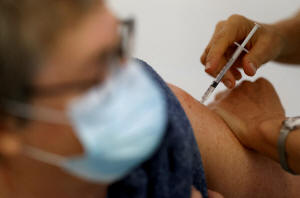Reinfection, severe outcome more common with BA.5 variant; virus spike
protein toxic to heart cells
 Send a link to a friend
Send a link to a friend
 [July 29, 2022]
By Nancy Lapid [July 29, 2022]
By Nancy Lapid
(Reuters) - The following is a summary of
some recent studies on COVID-19. They include research that warrants
further study to corroborate the findings and that has yet to be
certified by peer review.
Reinfections, severe outcomes may be more common with BA.5
Compared with the earlier Omicron BA.2 subvariant, currently dominant
Omicron BA.5 is linked with higher odds of causing a second SARS-COV-2
infection regardless of vaccination status, a study from Portugal
suggests.
From late April through early June, researchers there studied 15,396
adults infected with the BA.2 variant and 12,306 infected with BA.5.
Vaccines and boosters were equally effective against both sublineages,
according to a report posted on Monday on medRxiv ahead of peer review.
However, 10% of BA.5 cases were reinfections, compared to 5.6% of BA.2
cases, which suggests a reduction in protection conferred by previous
infection against BA.5 compared to BA.2, the researchers said. Moreover,
the vaccines appeared to be less effective in reducing the risk of
severe outcomes for BA.5 compared with BA.2.

"Among those infected with BA.5, booster vaccination was associated with
77% and 88% reduction in risk of COVID-19 hospitalization and death,
respectively, while higher risk reduction was found for BA.2 cases, with
93% and 94%, respectively," the researchers wrote. While "COVID-19
booster vaccination still offers substantial protection against severe
outcomes following BA.5 infection," they said, their findings provide
"evidence to adjust public health measures during the BA.5 surge."
Virus spike protein damages heart muscle cells
The spike protein on its surface that the coronavirus uses to break into
heart muscle cells also triggers a damaging attack from the immune
system, according to new research.
The SARS-CoV-2 spike protein interacts with other proteins in cardiac
myocytes to cause inflammation, researchers said on Wednesday in a
presentation at the American Heart Association's Basic Cardiovascular
Sciences Scientific Sessions 2022. In experiments with mice hearts,
comparing the effects of SARS-CoV2 spike proteins and spike proteins
from a different, relatively harmless coronavirus, the researchers found
that only the SARS-CoV-2 spike protein caused heart dysfunction,
enlargement, and inflammation. Further, they found, in infected heart
muscle cells only the SARS-CoV-2 spike interacted with so-called TLR4
proteins (Toll-like receptor-4) that recognize invaders and trigger
inflammatory responses. In a deceased patient with COVID-19
inflammation, the researchers found the SARS-CoV-2 spike protein and
TLR4 protein in both heart muscle cells and other cell types. Both were
absent in a biopsy of a healthy human heart.
[to top of second column]
|

A medical worker administers a dose of the "Cominarty" Pfizer-BioNTech
coronavirus disease (COVID-19) vaccine to a patient at a vaccination
center in Ancenis-Saint-Gereon, France, November 17, 2021. REUTERS/Stephane
Mahe/File Photo/File Photo

"That means once the heart is infected with SARS-CoV-2, it will
activate the TLR4 signaling," Zhiqiang Lin of the Masonic Medical
Research Institute in Utica, New York said in a statement. "We
provided direct evidence that spike protein is toxic to the heart
muscle cells and narrowed down the underlying mechanism as spike
protein directly inflames the heart muscle cells," he told Reuters.
"More work is being done in my lab to test whether and how spike
protein kills heart muscle cells."
Omicron-targeted antibody combo nears human trials
A new monoclonal antibody combination can prevent and treat Omicron
infections in monkeys, researchers reported on Monday in Nature
Microbiology.
The antibodies, called P2G3 and P5C3, recognize specific regions of
the spike protein the SARS-CoV-2 virus uses to enter cells. "P5C3
alone can block all SARS-CoV-2 variants that had dominated the
pandemic up to Omicron BA.2," said Dr. Didier Trono of the Swiss
Institute of Technology in Lausanne. "P2G3 then comes to the rescue
as it not only can neutralize all previous SARS-CoV-2 variants of
concern, but it can also block BA.4 and BA.5," he said. "P2G3 is
even effective against some BA.2 or BA.4/BA.5 mutants capable of
escaping (Eli Lilly's) bebtelovimab, the only antibody approved for
the clinics still displaying activity against the currently dominant
BA.4/BA.5 subvariants."
In lab experiments, mutations that might make SARS-CoV-2 variants
resistant to P2G3 did not allow escape from P5C3, and P5C3 escape
mutants were still blocked by P2G3, Trono said. "In essence, the two
antibodies cover for each other, one filling in for the lapses of
the other and vice versa."

Aerium Therapeutics plans to start testing the combination in humans
next month, said Trono, who is among the company's founders. If
larger trials eventually confirm its effectiveness, the P5C3/P2G3
combination will be given by injection every three-to-six months to
people who are immunocompromised and do not have a strong response
to COVID-19 vaccines, the company has said.
(Reporting Nancy Lapid; Editing by Bill Berkrot)
[© 2022 Thomson Reuters. All rights
reserved.]
This material may not be published,
broadcast, rewritten or redistributed.
Thompson Reuters is solely responsible for this content. |